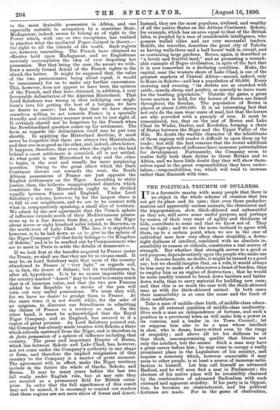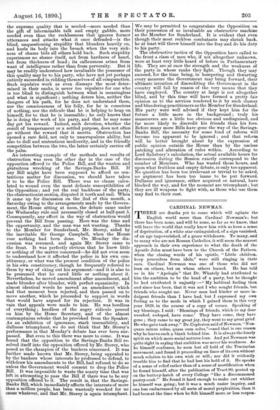THE POLITICAL TRIUMPH OF DULLNESS.
IT is a favourite maxim with many people that there is no object in the whole scheme of creation that has not got its place and its uses ; that even those pachyder- matous and apparently useless animals, the rhinoceros and the hippopotamus, slow, thick-skinned and unbeautiful as they are, still serve some useful purpose, and perhaps by reason of their very want of agility and thickness of hide, contribute to some end that we know not of. They may be right ; and we are the more inclined to agree with them, up to a certain point, when we see in the case of individual men how very often sheer stupidity, a down- right dullness of intellect, combined with an absolute in- sensibility to reason or ridicule, constitutes a real source of strength. But whether that strength serves to a good or evil purpose, depends entirely upon the people who make use of it. In some hands, no doubt, it might be turned to a good use ; but we should imagine that, as a rule, it would always be less easy to make of a rhinoceros a beast of burden, than to employ him as an engine of destruction ; that he would be more readily trained to break down barriers and batter down walls, than to carry material for building new ones; and that this is as much the case with the thick-skinned man as with the thick-skinned animal. In both cases their insensibility is at once the cause and the limit of their usefulness.
Take a man of middle-class birth, of middle-class educa- tion, in all external qualities of middle-class mediocrity. Give such a man an independence of fortune, and such a position in a provincial town as will make him a power in its vestries, and a leader in its Town Council ; let us suppose him also to be a man whose intellect is slow, who is dense, heavy-witted even to the verge of stupidity ; and above all let his dullness be of that thick, uncompromising quality that blunts not only the intellect, but the senses. Such a man may have a great career before him : he may come to occupy a really prominent place in the Legislature of his country, and acquire a notoriety which, however unenviable it may seem to other people, is at least a source of immense satis- faction to himself. Let him call himself an advanced Radical, and he will soon find a seat in Parliament ; the electors of his native place will be irresistibly charmed by the combination of advanced Radicalism with such outward and apparent stolidity. If his party is in Opposi- tion, he becomes an obstructionist, and his political fortunes are made. For in the game of obstruction, the supreme quality that is needed—more needed than the gift of interminable talk and empty gabble, more needed even than the recklessness that ignores former utterances and attacks what it once defended—is the blind, unquestioning stupidity that blunders heavily on, and hurls its body into the breach when the very sick- ness of shame bids all others hold back. Such stupidity experiences no shame itself, not from hardness of heart, but from thickness of head ; its callousness arises from want of intelligence rather than from perversity. But it may be readily understood how invaluable the possessor of this quality may be to his party, who have not yet perhaps entirely succeeded in ridding themselves of all compunction. Such repulsive work as even dismays the most deter- mined in their ranks, is never too repulsive for one who is too blind to distinguish between what is meaningless and what is significant ; nothing deters him, neither the dangers of his path, for he does not understand them, nor the consciousness of his folly, for he is conscious of nothing, nor the ridicule that he is helping to heap on himself, for to that he is insensible ; he only knows that he is doing the work of his party, and that he may some day get his reward. Indeed, such devotion, whether the result of temperament or a settled purpose, does not often go without the reward that it merits. Obstruction has opened a rare field, not only to unscrupulous ability, but also to dull and sententious mediocrity, and in the friendly competition between the two, the latter certainly carries off the palm. An interesting example of the methods and results of obstruction was seen the other day in the case of the opposition offered to the Police Bill, and the wanton and gratuitous wrecking of the Savings-Banks Bill. If any Bill might have been supposed to afford no con- tentious matter for discussion, we should have taken it to be the Police Bill. There was no clause calcu- lated to wound even the most delicate susceptibilities of the Opposition ; and yet the real backbone of the party, the obstructionist section, disputed it tooth and nail. When it came up for discussion on the 2nd of this month, a Saturday owing to the arrangements made by the Govern- ment, the House sitting at noon, the debate came under the Wednesday rule and necessarily closed at half-past 5. Consequently, any effort in the way of obstruction would prevent the Bill from passing. Here was the time and the opportunity, and the man was not wanting. Thanks to the Member for Sunderland, Mr. Storey, aided by the inevitable Sir George Campbell, when the House rose nothing had been done. On Monday the dis- cussion was resumed, and again Mr. Storey came to the front. It was perfectly obvious that he knew little or nothing of the matter concerned—he did not even seem to understand how it affected the police in his own con- stituency, or what was the present condition of the police in his own constituency, though he frequently referred to them by way of eking out his argumentand it is also to be presumed that he cared little or nothing about it. Nevertheless, he moved amendment after amendment, and made blunder after blunder, with perfect equanimity. In almost identical words he moved an amendment which had that moment been rejected, and then passed on to move another, which he proceeded to support in words that would have argued for its rejection. It was in vain that appeals were made to him. He was heedless of everything ; heedless of the angry ridicule poured on him by the Home Secretary, and of the almost contemptuous rebuke that he provoked from the Speaker. As an exhibition of ignorance, stark insensibility, and dullness triumphant, we do not think that Mr. Storey's performance in that Monday's debate has ever been sur- passed. But even to this there was more to come. It was found that the opposition to the. Savings-Banks Bill re- solved itself into the opposition offered by Mr. Storey, who posed as the champion of the bankers concerned. It was further made known .that Mr. Storey, being appealed to by the bankers whose interests he professed to defend, to withdraw his amendments to the Bill, had refused to do so unless the Government would consent to drop the Police Bill. It was impossible to waste the scanty time that was i left in attempting to pass the Bill if there was to be any opposition offered to it. The result is, that the Savings- Banks Bill, which immediately affects the interests of more than a million people, has been wantonly wrecked for no cause whatever, and that Mr. Storey is again triumphant. We may be permitted to congratulate the Opposition on their possession of so invaluable an obstructive machine as the Member for Sunderland. It is evident that even though their most reckless combatants may shrink back, he at least will throw himself into the fray and do his duty to his party.
The obstructive tactics of the Opposition have called to the front a class of men who, if not altogether unknown, were at least very little heard of before in Parliamentary life. They are at once the strength and the weakness of the party in whose ranks they fight. Though they may succeed, for the time being, in hampering and thwarting every measure the Government may bring forward, their ultimate intention of discrediting the Government in the country will fail by reason of the very means that they have employed. The country at large is not altogether blind, and by this time will have formed a pretty fair opinion as to the services rendered to it by such clumsy and blundering practitioners as the Member for Sunderland. His party were well advised if they kept him for the future a little more in the background ; truly his manceuvres are a little too obvious and undisguised, and far more likely to discredit his friends than his foes. Before many more Bills have gone the way of the Savings- Banks Bill, the necessity for some kind of reform will become too apparent to be ignored ; and that reform will be better brought about by the expression of public opinion outside the House than by the useless patching and alteration of rules within. According to Lord Salisbury's calculation, the actual available hours for discussion during the Session exactly correspond to the number of Members. Who has wasted those hours, and upon what fruitless and empty debate, is only too apparent. No question has been too irrelevant or trivial to be asked, no argument has been too inane to be put forward. Dullness and ignorance, either acquired or natural, have blocked the way, and for the moment are triumphant ; but they are ill weapons to fight with, as those who use them may find to their cost.



































 Previous page
Previous page